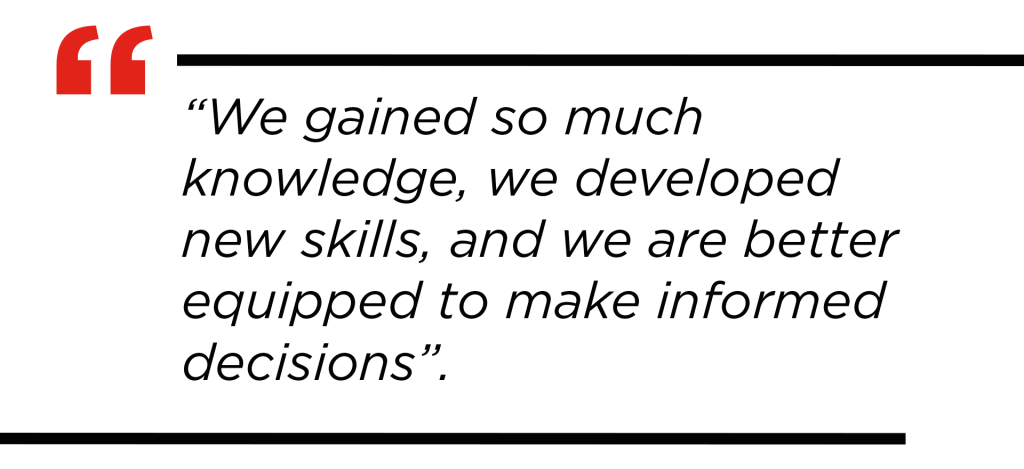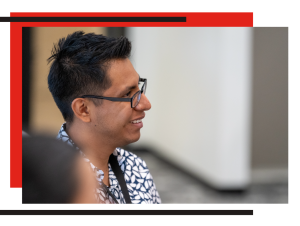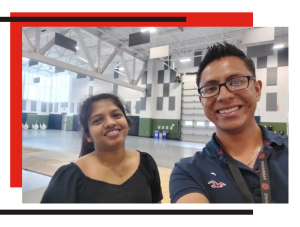Reflections & Discoveries with Carlos Jesus Amaro Valenzuela

It was during the summer of 2024 that Fanshawe Global organized its second custom training program for a group of 13 Mexican students under the funding scheme called: “Beca Embajadores de Queretaro” Mexico.
Carlos Jesus Amaro Valenzuela, embarked on a transformational journey to explore new horizons in the aerospace and automotive industries. He is specialized in material engineering and aeronautical maintenance and also worked as the General Assistant for TCI for 4 years.
 For Jesus, visiting Canada for the first time was a whirlwind of excitement, discovery, and reflection. He explored the intricacies of the buildings and transportation industries throughout his lifetime. One particular visit he took left an impression that lasted for many years to come. There were many advanced engineering applications and cutting-edge technologies that he encountered. Yet, even in his awe, Jesus felt a sense of concern. “It was both remarkable and concerning at the same time,” he reflected, pondering how artificial intelligence and automation might affect the workforce of the future in the future.
For Jesus, visiting Canada for the first time was a whirlwind of excitement, discovery, and reflection. He explored the intricacies of the buildings and transportation industries throughout his lifetime. One particular visit he took left an impression that lasted for many years to come. There were many advanced engineering applications and cutting-edge technologies that he encountered. Yet, even in his awe, Jesus felt a sense of concern. “It was both remarkable and concerning at the same time,” he reflected, pondering how artificial intelligence and automation might affect the workforce of the future in the future.
The visit to J-AAR, a company known for its innovative construction and engineering practices, was one of the pivotal moments of Jesus’s experience. This experience gave Jesus much insight into how organizations work and how teamwork is crucial. He observed how the hiring process differed from what he was used to in Mexico. Jesus said that the hiring process in Mexico has a specific curriculum, reflecting his country’s structured hiring process. Among Canadian organizations, he was particularly impressed by the focus on specialization. “There are particular people who are specialized in their field to work for a company,” he said. There’s no requirement to mention an area of specialization in a resume in Mexico, contrasting the different approaches to employment here in Canada.
As part of the Diamond Aircraft visit, Jesus had the unique opportunity to witness firsthand how the materials are meticulously worked on to produce the important parts of an aircraft. This was another eye-opening experience for him. As Jesus recalled, he was amazed at the precision and skill involved in the manufacturing process when he saw how the moulds and oil tanks were inserted into engines. Through this hands-on experience, he gained an insight into the complexities of the aerospace industry and the critical role each component plays in fuel efficiency and safety.
Jesus was impressed by the level of precision and innovation at Sodecia’s manufacturing facility, a global industrial corporation specializing in automotive solutions. According to Jesus, the company’s commitment to integrating cutting-edge technologies into its processes has enabled them to design and produce automotive components in an incredibly advanced manner.
His attention was drawn to Sodecia’s approach to automation and robotics as he witnessed firsthand how humans and machines worked seamlessly together. As he recognized the delicate balance between automation and skilled labour, he reflected: “It is fascinating to see how technology can enhance efficiency without completely replacing the human element.” The experience helped him understand the rapidly evolving automotive industry and the need to stay current.
 It became obvious to Jesus that education was the key to navigating these complex issues, and this realization resonated deeply with him, echoing the principles of the Sustainable Development Goals (SDGs), which emphasizes the importance of education for all. As a result of the trip, he became more convinced that education empowers individuals to make informed decisions, especially in an advancing technological world.
It became obvious to Jesus that education was the key to navigating these complex issues, and this realization resonated deeply with him, echoing the principles of the Sustainable Development Goals (SDGs), which emphasizes the importance of education for all. As a result of the trip, he became more convinced that education empowers individuals to make informed decisions, especially in an advancing technological world.
Despite the language barrier he faced as a native Spanish speaker, Jesus was able to understand technical English because he once worked in the field. Having the opportunity to interact with Portuguese speakers during his time in the diverse linguistic environment enriched his cultural experience and highlighted the importance of adaptability in a globalized society. I had expected public transportation at home in his hometown to be unpredictable, but here it is remarkably punctual,” he observed, appreciating the stark contrast with his homeland.
In the days, Jesus’ awareness of sustainability grew. In particular, he was impressed by Canada’s commitment to recycling, the use of electric vehicles, as well as the use of renewable energy sources such as solar panels and windmills. As a result of these observations, he was forced to think about how they would affect his own country in a wider sense. In his remarks, he pointed out that Mexico lacks education on sustainability, and this is something we should address as a society, drawing a connection with the SDGs which focuses on responsible consumption and production.
The most profound moment in Jesus’ life occurred when he was visiting Niagara Falls. Standing in front of such majestic waters, he felt an intense sense of gratitude and introspection. It was a place where he could unplug from technology for a few hours and reflect on his life. As a result, he acquired a deeper appreciation of the natural world and a renewed sense of self as a result of the experience.
As the program came to an end, Jesus looked back at his journey with a sense of fulfilment, even though it had come to a close. The trip, in his view, had been a truly enlightening experience that gave him valuable knowledge about technology, culture, sustainability, and self-discovery. In his view, education is key. That’s the way he summarized it. By participating in such a trip, “we gained so much knowledge, we developed new skills, and we are better equipped to make informed decisions”.
![]() Read more about the customized Aerospace and Automotive program for students from two polytechnic universities in Mexico during the summer of 2024.
Read more about the customized Aerospace and Automotive program for students from two polytechnic universities in Mexico during the summer of 2024.


